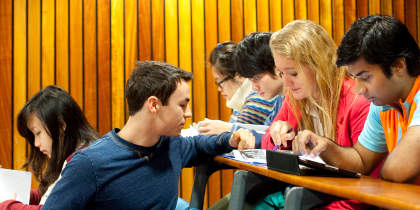
January 30, 2007, by Teaching at Nottingham
“Please turn on your mobile phones” – ubiquitous computing in the classroom
Mette Asmild, Andrew Jackson, Benson Lau and Nick Mount:
“The adoption of the mobile telephone has revolutionised social and commercial communication in the 21st Century. Whilst it is estimated that the majority of students in British higher-education (HE) use mobile-‘phones and text/SMS-messaging, the learning benefits of adopting and supporting mobile ‘phone text-messaging communication from students to lecturers in the HE classroom have not been adequately investigated. Nevertheless, such ubiquitous learning tools may provide a new and powerful pedagogy permitting anonymity in questioning and allowing lecturers to respond in real-time to the unanswered needs of their class. This project investigated the practical issues and problems associated with the use of adopting real-time text messaging communication from students to lecturers.
“In the first instance we examined the availability of ‘phones amongst students (115 2nd year BSc business, 22 MSc geographic information systems, 12 MSc cancer immunotherapy, 21 MSc oncology students) and their attitude to the proposed new technology in teaching. A total of 98% of students had SMS-capable mobile phones and whilst 61% of questioned undergraduate business students texted during lectures, only 39% were in favour of an SMS-based student participation service. There was a lack of willingness to pay the cost of SMS to access the service and considerable variability in student’s attitudes towards the introduction of mobile learning into their lectures, challenging the positive view extended in the literature.
“The study was undertaken using the ‘txttools’ system (provided by Cy-nap Limited), which enables users to interactively manage, send and receive text messages to selected groups of phones using a secure, web-based interface in real-time. The students were given a dedicated number, to which they could send SMS-messages to their lecturers both during and after lectures. All call data were logged in order to analyze the user participation. Furthermore, the individual students’ perception and usage were examined using a questionnaire towards the end of the trial. Finally, the lecturers experience with the system, including practical problems and overall perceptions were investigated.
“This study confirms that the majority of students in higher education have personal access to mobile ‘phone technology and use text messaging frequently. Furthermore, as indicated in our pilot study, there was reluctance to use the SMS-technology in the classroom by some student groups. The key obstacles faced were technological, e.g. lack-of mobile signal or intentional blocking of signals. In future these issues would be addressed with co-operation from the University and with additional investment from mobile-‘phone companies. If SMS technology were to find a place in the HE classroom it may be necessary to provide each student with a budget to facilitate their full participation. We will present a summary of our findings and host a real-time demonstration of SMS-based student participation in lectures.”
Paper presented at the University’s Tenth Learning & Teaching conference (January, 2007).
| Dr Mette Asmild Nottingham University Business School |
Dr Andrew Jackson Lecturer, Chair Research Theme Committee, MSc Research Project Module Convenor School of Molecular Medical Sciences |
| Benson Lau Course Director, MArch Environmental Design. Architect/Lecturer, Institute of Architecture Department of Architecture and the Built Environment |
Dr Nick Mount Lecturer in Physical Geography School of Geography |
This article was originally published as part of PESL’s Teaching at Nottingham collection.
No comments yet, fill out a comment to be the first

Leave a Reply